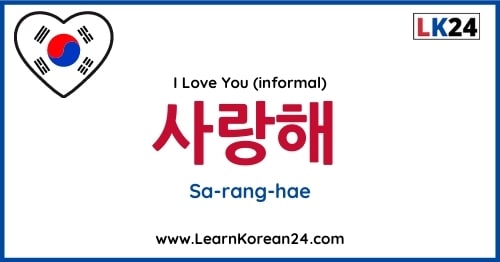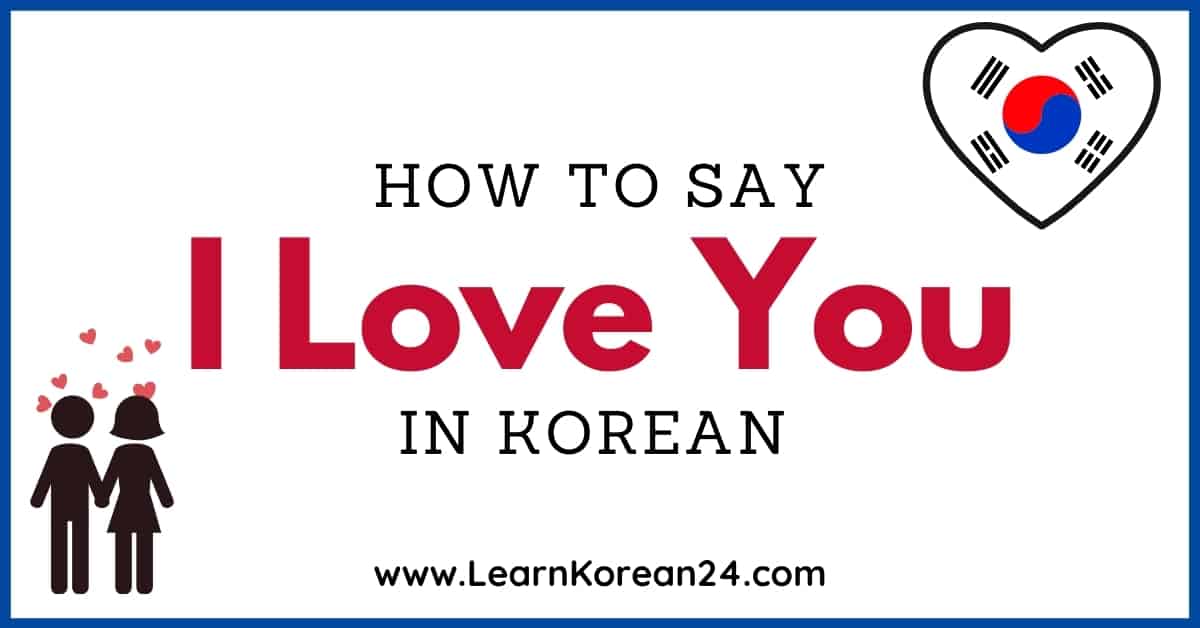Saranghae: How To Say ‘I Love You’ In Korean
Saranghae means ‘I love you’ in Korean. Being able to say “I love you” in Korean is important for many Korean language learners. Maybe you want to tell a special someone “I love you” to let them know you have romantic feelings for them. Maybe you want to tell your favorite Kpop star that you love them in Korean. Or maybe you want to express your feelings of love to your friends and family members.
In this lesson, we will teach you how to use ‘Saranghae’ to say “I love you” in Korean. We will also show you some related words and expressions to express your feelings in Korean.
Related: 20 Korean Love Quotes And Their Meanings
How To Say “I love you” in Korean?
The most common way to say “I love you” in Korean is 사랑해 [sa-rang-hae]. This comes from the Korean verb 사랑하다 [sa-rang-ha-da] which means ‘to love’. When the verb ‘to love’ is conjugated in the present tense, it becomes 사랑해 [sa-rang-hae].
Related: “I Miss You” In Korean
Saranghae = “I Love You” In Korean – Informal

As was mentioned above, the most common way to say “I love you” in Korean is 사랑해 (sa-rang-hae). This is the informal way to say “I love you” in Korean. This means that you can use this with people close to you and people younger than you.
Most of the time you will surely be very close to the person you are saying “I love you” to, so this way of saying “I love you” in Korean can be used in most situations. For example, with your girlfriend or boyfriend, with your husband or wife, you can use the informal way to say “I love you” because you are already very close to them.
You can also use this informal way to tell family members, such as brothers, sisters, and parents that you love them.
In some situations, you may want to say “I love you” in a more polite way. That’s what we’ll look at next.
Saranghaeyo = “I Love You” in Korean – Polite

The polite way to say “I love you” in Korean is 사랑해요 (sa-rang-hae-yo). You have probably noticed that it is the same as the informal way, but with ‘요’ (yo) attached. 요 is the ending added to verbs to change that verb into the polite form. As you learn more and more Korean, you will notice many Korean expressions end with 요 (yo).
This polite way to say “I love you” in Korean is not used as much as the informal way. This is because with most people you love, you already have a very close relationship, so it is fine to use the informal way. However, you may want to use the polite way to say “I love you” in various different situations.
For example, with parents, parents in law, teachers, etc, you may want to use the polite way to say “I love you” to show your appreciation, gratitude, and affection in a more polite and respectful way.
Saranghamnida = “I Love You” In Korean – Formal

If you want to sound super polite and respectful when saying “I love you” in Korean, you can use the formal way.
The formal way to say “I love you” in Korean is 사랑합니다 (sa-rang-ham-ni-da). Again, the formal way to say “I love you” is not used very often with couples and people you are really close to. However, sometimes people may choose to say it in the formal way because they want to show a lot of respect.
For example, if you are telling your parents “I love you” on parents day, which is a special day to celebrate parents in Korea, you would say 사랑합니다 to say “I love you” in a very polite and respectful way.
You may also see this formal way to say “I love you” in Korean advertisements when businesses are telling their customers that they love them they would say “고객님 사랑합니다”. This is because they want to express their love for their customers, but they are not close to them, so it would be strange and impolite to use the informal way to say “I love you”.
Nado Saranghae = “I Love You, Too” In Korean

If you tell someone that you love them in Korean, you will surely hope to hear ‘I love you, too.” “I love you, too” in Korean is 나도 사랑해 (na-do sa-rang-hae). 나 means ‘I’ and 도 means ‘too/also’. So 나도 사랑해 literally translates as ‘I too love’.
“I love You” In Korean – Example Sentences
오빠 사랑해 (oppa saranghae)
Oppa Saranghae (오빠 사랑해) or Saranghae Oppa (사랑해 오빠) is a way for women to say “I love you” to older men. 오빠 means ‘older brother’ and is used by women to call men older than them. Oppa Saranghae can be used by women to say “I love you.” to their boyfriend who is older than them, or to their older brother in their family.
엄마 사랑해 (eom-ma sa-rang-hae)
If you want to say “I love you” in Korean to your mom, you would say 엄마 사랑해. 엄마 means mom in Korean. If you would like to say “I love you” to other members of your family, simply replace 엄마 with the names of other family members in Korean.
자기야 사랑해 (jagiya saranghae)
자기야 사랑해 means ‘honey, I love you.’ and can be used with your boyfriend or girlfriend to say “I love you” in Korean. 자기야 is an affectionate way to call you boyfriend or girlfriend and is similar to ‘honey’, ‘darling’, ‘baby’ in English. For more details and example sentences with ‘jagiya’, check out our other post, What Does Jagiya Mean.
나 너 사랑 하는 거 같아 (na neo sa-rang ha-neun geo gat-tta)
If you want to say “I think I love you” in Korean you would say 나 너 사랑 하는 거 같아.
하늘만큼 땅만큼 사랑해 (Ha-nul-man-keum ddang-man-keum sa-rang-hae)
This way to say “I love you” in Korean is great if you want to say “I love you so much.” or ” I love you a lot. 하늘만큼 means ‘as much as the sky’ and 땅만큼 means ‘as much as the earth’. This Korean expression of love roughly translates as ‘I love you as much as the sky (is high) and as much as the earth (is wide).’
죽도록 사랑해 (Juk-do-rok sa-rang-hae)
This expression is another way to say that you really love someone a lot in Korean. 죽도록 사랑해 roughly translates as ‘I love you to death’ or ‘I love you (so much) I feel like I’m going to die’.
Thanks so much for reading to the end. Saranghae! ㅋㅋ
STUDY ONLINE WITH KOREAN ARAH!
Ready to take your Korean to the next level?
Get One-on-One Korean lessons from a qualified and experienced Korean language tutor!

